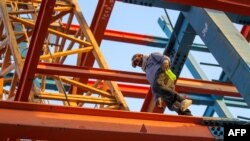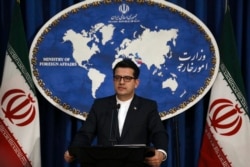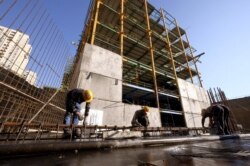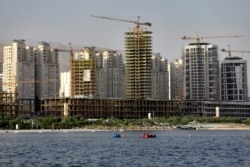Newly-announced U.S. sanctions targeting Iran's construction sector have drawn a skeptical response from some Iran analysts who foresee the measures doing only limited harm to one of its top industries.
In an Oct. 31 announcement, the Trump administration said it had imposed sanctions on Iran's construction sector for being controlled "directly or indirectly" by the nation's Islamic Revolutionary Guard Corps (IRGC), a military branch designated by U.S. officials as a terrorist organization earlier this year.
Iran sees itself as a victim, rather than a perpetrator, of terrorism. In a Saturday statement, Iranian foreign ministry spokesman Abbas Mousavi denounced the U.S. sanctions on the nation's construction industry as "economic terrorism" and said they reflected "weakness" and "failure in (American) diplomacy."
IRGC-controlled companies such as Khatam al-Anbiya dominate Iran's construction sector. Previous U.S. administrations sanctioned Khatam al-Anbiya in 2007 and four of its affiliates in 2010.
A State Department fact sheet said the new sanctions target international transactions with Iranian construction companies involving four specific commodities and products: raw and semi-finished metals, graphite, coal, and software for integrating industrial purposes.
"If you look at this designation of Iran's construction sector, it is very limited," said Saeed Ghasseminejad, a researcher on Iran's economy and financial markets at the Washington-based Foundation for Defense of Democracies (FDD).
Speaking to VOA Persian, Ghasseminejad said Iranian construction companies typically produce their own basic commodities such as steel and cement rather than relying on certain imports targeted by the new U.S. sanctions. He said Iran also commonly imports other construction commodities and products not targeted by the sanctions, such Polyvinyl Chloride (PVC), a thermoplastic, and tiles used in upper- and middle-class homes.
"So there still are items that can be designated which are not," he said.
Ghasseminejad also noted that many Iranian construction companies linked to Iran's Islamist rulers have not faced the type of specific U.S. sanctions previously applied to IRGC-controlled Khatam al-Anbiya and its affiliates. He said other organizations involved in construction and controlled by IRGC or by Iranian Supreme Leader Ayatollah Ali Khamenei have a big share of the construction market, such as the Mostazafan Foundation and Astan Quds Razavi, two charitable trusts led by Khamenei appointees.
Iran also has an unknown number of private construction companies, some of which have connections to Iranian government bodies, according to Ghasseminejad.
"There still is a lot to sanction in the construction sector," said Ghasseminejad. "The Trump administration should designate the whole sector by saying that any kinds of dealings with it are prohibited."
FDD has said such a step is necessary not only because of IRGC dominance of the construction industry but also because it supplies key products for Iran's missile program.
Campaign of 'maximum pressure'
Trump has been tightening U.S. sanctions against Iran since last year as part of his campaign of "maximum pressure" on the Islamic republic to end its missile and other perceived malign activities.
Iran analyst Ali Vaez of the Belgium-based International Crisis Group said previous rounds of sanctions imposed by Trump and his predecessors have weakened Iran's economy and its construction sector to the point where the new sanctions are unlikely to hurt the sector much further.
"The important point here is because of the economic downturn in Iran, generally there is a slowdown in the construction business, and as a result, Iran needs less raw material than before," Vaez told VOA Persian. "There is less demand for new construction than in the past, and as such, whatever impacts the previous U.S. sanctions had on the construction sector in Iran, I think they already have been felt and absorbed in the sector."
Data published by the Statistical Center of Iran show the nation's construction sector contributed 2.9% to gross domestic product for the last Persian year that ended in March, around the same level as in the previous two years. Prior to that, the contribution of construction to Iran's GDP had been on a steady decline from a level of 5% in the year that ended March 2012.
Ownership and activities
Another factor that could limit the impact of U.S. sanctions on Iran's construction sector is a lack of information available to U.S. authorities regarding the ownership and activities of many companies.
In messages sent to VOA Persian, economist Mahdi Ghodsi of the Vienna Institute of International Economic Studies said he found only 144 large Iranian construction companies registered in Orbis, a Moody's Analytics database of financial statements of companies around the world. He said that the estimated turnover of 113 of those companies amounted to 0.5% of Iran's GDP, only a small part of the total construction activity in the country.
"The rest of the construction sector in Iran is not transparent. The reason could be simply to avoid the sanctions radar of the U.S. Treasury," Ghodsi wrote.
Further complicating the challenge of sanctioning Iranian construction companies is their involvement in reconstruction efforts in war-torn Syria and in other projects in Iraq, Central Asia, Africa and Latin America.
"Most of the Iranian companies engaged in these kinds of activities do not publicize them," said Vaez. "Sometimes they use shell companies so that you don't know that a particular company is of Iranian origin. At the end of the day, this is a very elaborate game of cat and mouse, with the Iranians trying to obfuscate and operate in the shadows, and the U.S. Treasury trying to spotlight and designate them."
Ghasseminejad said the new U.S. sanctions also may not do much to stop the activities of Chinese and other foreign construction companies in Iran.
"Since the entire Iranian construction sector has not been designated, the pressure on foreign companies to leave the Iranian market has not been that big," Ghasseminejad said. "If the U.S. actually sanctions the whole industry, and enforces that policy, it will impact the presence in Iran of foreign firms that bring investment, equipment and expertise, and it will impact one of Iran's few economic sectors that exports services to other countries, where they go and build things."
This article originated in VOA's Persian Service.







